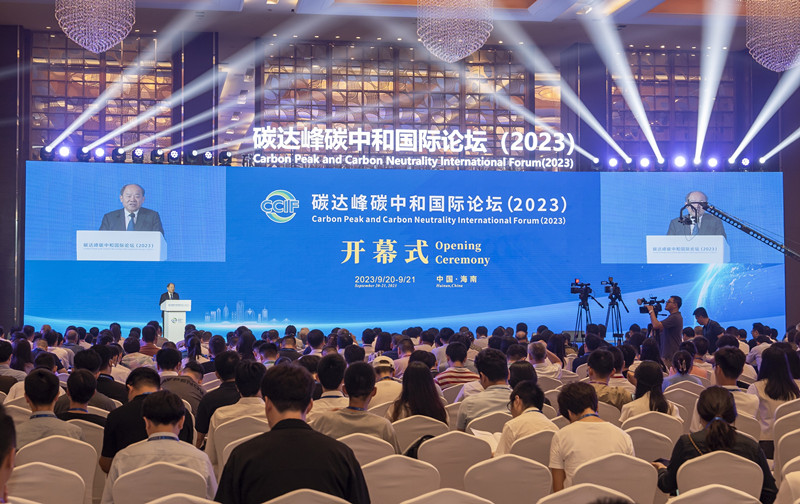On September 20, experts and scholars from China and around the world gathered at the first Carbon Peak and Carbon Neutrality International Forum, held in Haikou, capital of south China’s Hainan Province, to share insights on new technologies and new solutions to reduce carbon emissions in the island province.

The opening ceremony of the Carbon Peak and Carbon Neutrality International Forum was held in Haikou on Sept. 20. (Photo: Li Hao / Hinews)
Organized by the China Energy Research Society, the two-day forum brought together several scholars from the Chinese Academy of Engineering and the Chinese Academy of Sciences to deliver their views on switching over to low-carbon energy, the high-quality development of carbon capture, usage and storage (CCUS) technologies, carbon neutral construction systems, the hydrogen energy industry, zero emissions, and more.
Domestic and international experts will attend different themed sub forums to exchange ideas on green development, the new energy industry, digital empowerment of the environmental, social, and governance (ESG) oriented markets, International Renewable Energy Certificates, and other related topics.
During the forum, an expo is also being held to showcase the latest technologies and products from different vendors who are providing solutions for Hainan’s ongoing development in clean energy, hydrogen energy, the digital smart low-carbon industry, and other areas.

An expo featuring the latest low-carbon technologies and products is being held during the forum. (Photo: Li Hao / Hinews)
This year marks a vital stage for China’s commitment to achieve peak carbon emissions by 2030 and carbon neutrality by 2060. It is no accident that the island province of Hainan is playing host to the first Carbon Peak and Carbon Neutrality International Forum.
According to Shi Yubo, chairman of the China Energy Research Society, Hainan boasts the most abundant marine energy resources in the country, and especially blue carbon ecosystems making significant contributions to climate change adaptation and mitigation. The Haikou forum aims to explore more paths for the green, low-carbon development of Hainan.
“Hainan should make full use of marine energy, including ocean tides, currents, waves, and marine photovoltaic and wind power to support sustainable energy development,” said Wang Zhonglin, head of the Beijing Institute of Nanoenergy and Nanosystems in the Chinese Academy of Sciences. He added that the new power generation technology developed by his institute can be used to produce marine energy in Hainan.